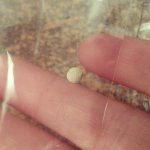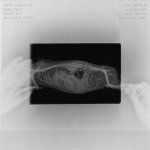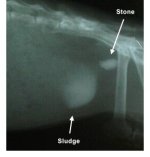Urinary tract stones, also called uroliths, can form in the kidney, the ureter (the tube from the kidney to the bladder), or in the bladder. In guinea pigs, they most often form in the bladder. Stones in the kidney or ureter are very difficult or impossible to treat, and the outcome is usually fatal.
The most important things to know about stones
- They require vet care, the quicker the better.
- They will NOT get better on their own, and there's not much you can do to help.
- They can't be dissolved once they've formed.
- Only very small stones can be passed with urine. Females pass stones more easily than males because their urethra is much shorter. A stone is more likely to get stuck in a male's longer urethra.
- Stones can fall into the urethra and completely block the flow of urine. This is a painful emergency, and the pig may not survive.
Causes
The major causes, listed below, are well known. What is not clear is how they interact with each other, or why some pigs get stones and others don't.- Infection
Not all infections will result in bladder stones, but stones can begin to form around bacteria in the bladder. Keep the cage clean!
- High-calcium diet
Very young pups need calcium for their growing bones. But after six months of age, calcium intake should be restricted. High-calcium veggies should only be given as treats (see veggie list for the amounts of calcium in foods), and pellets should contain a maximum of .4% calcium from a source that is not calcium carbonate (limestone).
- Lack of exercise
Pigges excrete extra calcium in their urine, and it can settle in the bladder as tiny crystals. Other foods can do this as well. Exercise keeps the crystals stirred up, and they are excreted when the pig pees. Lack of exercise allows the crystals to clump together into sludge and stones.
- Not enough drinking water
You need one more water bottle than the number of pigs you have, and they should be filled with fresh water daily. If you have a pig that doesn't drink much, you may need to syringe flavored water (with a little vegetable or fruit juice) to them to increase their water intake.
- Alkaline urine
Unlike humans, who have acidic urine, guinea pigs have alkaline or basic urine. Stones form more easily in an alkaline environment. Because the urine is alkaline, attempts to make it more acid by feeding cranberry juice will not work in herbivores.
- Genetics
Some pigs are just prone to stones. Some pigs within the same litter may have stone problems while others do not. They may even develop stones within just a couple of weeks after having surgery to remove stones. Some pigs live long lives with no problems whatsoever, even with high calcium diets and little exercise.
- All of the above, or any combination of them
Signs and Symptoms
- Squeaking while peeing or pooping, particularly while pooping
- Blood in the urine, either clots or pink urine
- Hunching or squatting when peeing or pooping
- A wet bottom
- Can't pee. Get to the vet ASAP
- Pig just doesn't feel well -- isn't eating, drinking, or acting normally
Diagnosis
- X-ray is the surest way to diagnose them -- almost all stones will show up on x-ray
- Ultrasound is not nearly as effective as x-ray
- Urinalysis will show whether there is infection or blood in the urine
- Feeling for stones is nearly useless, particularly if the stones are small
Treatment
- Surgery is the only option if there are many stones or if they are large. It may also be required if stones are attached to the bladder wall. If the stones are in the kidney or the ureter, the pig will have to be seen by a specialist.
- Muscle relaxants may allow the urethra to stretch enough for a small stone to pass. A vet can prescribe one, or shilintong can be used.
- Stones in the urethra may be flushed back up into the bladder where they can be removed surgically. Or, in females, the vet may be able to extract them with specialized equipment.
Prevention
Keeping in mind that it may not be possible to prevent stones in pigs that are prone to them, here are some things to lessen the chances that your piggie will develop them.- Avoid pellets that use calcium carbonate as the calcium source
- Avoid pellets (when possible) where the calcium exceeds .4%
- Feed high calcium veggies no more than once or twice a week, if then
- Give high calcium herbs (parsley, basil, arugula, spinach, watercress) only as occasional treats
- Keep the pig well hydrated
- Make your pig exercise
- Feed your pig corn silk powder or corn silk tea
Corn silk has been used globally for centuries in native medicines. One frequent use is to treat urinary stones and bladder irritation. While this has not been widely recommended for guinea pigs, no problems are noted in the literature resulting from its use. Both Cavyspirit and bpatters have used it with their pigs. Corn silk powder can be purchased in the nutritional supplement aisles at grocery stores or pharmacies. Sprinkle some on veggies or pellets. Or try syringing corn silk tea.
Piggies LOVE corn silks! Just be sure to cut all the brown dried stuff off before giving it to them. In the summer, grocery stores will often put trash bins near the ears of corn for people to discard shucks, and you can often find silks and shucks there for free. Just use the inner shucks to avoid the pesticides on the outer dark green husks.
- Chanca piedra
Another herbal remedy that may be of use is chanca piedra. It is widely used in humans to treat stones of various kinds, but there is no rigorous scientific research supporting its use. There are anecdotal stories of guinea pigs being helped by it. It comes in capsules which can be broken open and sprinkled on food.
Bibliography
- https://veterinarypartner.vin.com/default.aspx?pid=19239&catId=102923&id=10817435
- https://avmajournals.avma.org/view/journals/javma/260/S2/javma.21.09.0421.xml
- https://guinealynx.info/stones.html
- https://smallpetselect.com/bladder-stones-in-guinea-pigs/
- https://www.ncbi.nlm.nih.gov/pmc/articles/PMC6268265/
- https://www.webmd.com/diet/health-benefits-corn-silk-tea
Acknowledgements
- Thanks to Mastershroom, Pibblelover at GPC for use of pictures
- Thanks to Sef at Guinealynx for use of pictures




